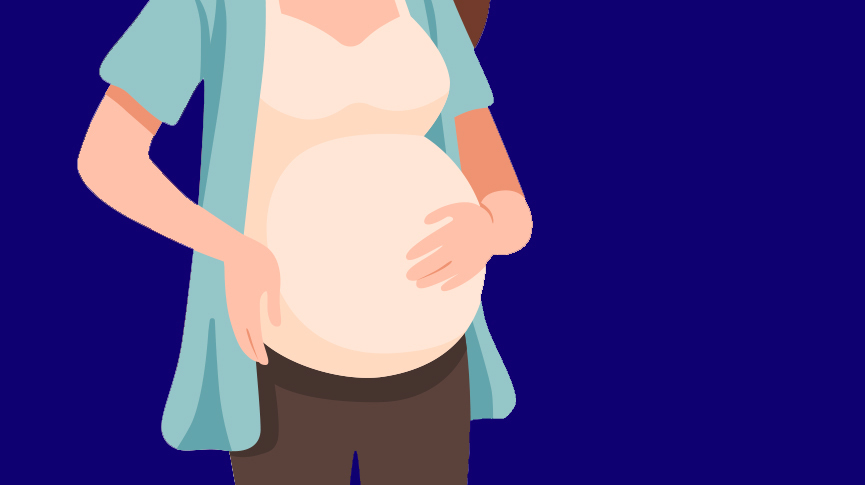The Itch Is Real: Yeast Infections During Pregnancy

This article was medically fact-checked by Consultant Obstetrician and Gynaecologist Dr. Shree Datta.
While the list of body changes one experiences during pregnancy is on-going, it can be argued that an uncomfortable, itchy vagina is among the worst. If you’ve ever experienced a yeast infection (3 out of 4 women), you know what I mean.
The itch is SO real. And it’s not until you can’t stop moving in every which position in hopes of finding comfort that you appreciate the moments when your vagina is not a fussy mess. Those days are truly under-appreciated (and feels like they are somewhere between slim and none while pregnant). Let’s talk about why!
What Is A Yeast Infection?
As described by the American Academy of Family Physicians, “vaginal yeast infections are caused by a fungus called Candida. Yeasts are tiny organisms that normally live in small numbers on the skin and inside the vagina. The acidic environment of the vagina helps keep yeast from growing. If the vagina becomes less acidic, too many yeasts can grow and cause a vaginal infection.”
A normal vaginal pH is between 3.8 and 4.5. The acidic balance of the vagina can be affected by a number of things, including but not limited to:
- Douching
- Bacterial vaginosis
- Menopause
- Presence of menstrual blood
- Presence of semen Antibiotics
- UTIs
Why Are Yeast Infections More Common During Pregnancy?
Yeast infections are more common during pregnancy than at any other time in a woman’s life, especially during the second trimester. During this time, your body goes through so many fluctuations and it’s difficult for it to keep up with the chemical changes in the vagina.
So why yeast infections?! During pregnancy, a change in hormonal balances, as well as a drop in the immune system’s ability to fight bacteria can lead to higher estrogen levels and higher glycogen content in vaginal secretions. Which in turn, can increase a pregnant person’s risk of developing a yeast infection. Higher glycogen content means there is more sugar in vaginal secretion on which the yeast can feed. This causes an imbalance and results in too much yeast.
What Is Safe To Do As Far As Treatment While Pregnant?
Generally, topical creams and ointments are safe to use while pregnant and oral medication should be avoided. The Center for Disease Control and Prevention recommends that only topical azole applied for at least 7 days to increase efficacy is accepted as safe for pregnancy. While the U.K.’s National Health Service recommends creams or pessaries for treatment rather than oral medication.
Topical azole antifungals are well studied, commercially available, and do not require a physician’s prescription.
This article, published by the College of Family Physicians of Canada, states that short-term use of a low-potency topical corticosteroids can be used for symptomatic relief and is considered safe to use in pregnancy.
Oral Fluconazole, on the other hand, should be avoided while pregnant. In this nationwide cohort study in Denmark, published in the Journal of the American Medical Association, use of oral fluconazole (the leading prescription pill) in pregnancy was associated with a statistically significant increased risk of spontaneous abortion compared with risk among unexposed women and women with topical azole exposure in pregnancy.
The 2016 study found that pregnant women who took oral fluconazole were 48 percent more likely to have a miscarriage than women who didn’t take the drug.
It is of course always best to consult your doctor or midwife before treating yourself for a yeast infection. If left untreated, yeast infections can pass to your baby’s mouth during delivery. This is called “thrush”.
I Am SO Uncomfortable! How Can I Find Some Natural Relief Working With What I Have At Home?
The jury is still out on these natural remedies, but they may be worth asking your healthcare provider about.
Some research shows that applying natural honey topically may inhibit the growth of bacteria and fungi due to its high concentrations of sugar. Honey also has a low pH, which is exactly the kind of environment Candida does not like. Adding antifungal plant chemicals by mixing it with powdered herbs will make an even more effective Candida fighting honey.
Note: Eating honey is not the same and can in fact aggravate your problem due to high sugar content diluted in the stomach, which Candida feeds on.
Coconut oil (topically) – coconut oil is an established antifungal and may act as a natural remedy for yeast infection relief. This study found that the Candida albicans strain was most susceptible to concentrated coconut oil and less coconut oil was needed to get rid of the yeast than fluconazole.
ACV (consumption and/or bath soak) – adding apple cider vinegar to a warm bath may help provide some relief from a yeast infection. The acidic component can eliminate harmful microorganisms, including yeast. You can also incorporate more ACV into your diet to help treat Candida. Take 1 tsp a day in a glass of water until you see results.
Preventative Measures?
It is of course best to try and do anything to fight Candida in the first place. I highly recommend taking a probiotic and/or cranberry supplement. Other preventative measures include:
- Avoid tight-fitting clothes
- Wear cotton underwear and avoid synthetic fabrics
- Go commando when sleeping so your vulva can breathe
- Dry yourself well before getting dressed following a bath or shower
- Change out of wet swimsuits ASAP
- The same goes for sweaty clothes
- Limit your time in tubs and bodies of water
- Avoid douching/the use of scented feminine products
- Take a probiotic
- Lower sugar intake
Of course one of the biggest steps you can take in healing and preventing further yeast infections, is to seek help early on so that it can be effectively diagnosed and treated.
Facts checked by:
Dr. Shree Datta
Dr. Shree Datta is a Consultant Obstetrician and Gynaecologist in London, specialising in women’s health including all menstrual problems such as fibroids and endometriosis. Dr. Shree is a keen advocate for patient choice, having written numerous articles and books to promote patient and clinician information. Her vision resonates with INTIMINA, with the common goals of demystifying periods and delivering the best possible care to her patients
Written by:

Bailey is a soon-to-be new mom who goes against the grain. With a degree in communication studies, she has built a skincare company alongside her partner, which represents her lifestyle: natural, holistic, and non-toxic. Re-learning everything she knew her entire life, she began to grow her knowledge for all things natural. As an advocate for truth and women’s empowerment, her passion for writing and sharing her knowledge began to mature. Here at Intimina, she shares her experiences with pregnancy, sexual wellness, and women’s health from the perspective of a non-Western view.




Kudos for the content! Apologies for chiming in, I am interested in your opinion. Have you heard about – Molemen Healing Herbs (erm, check it on google should be there)? It is an awesome one-off holistic product to get rid of your yeast infection and HSV 1&2 permanently. I’ve heard some unbelievable testimonies about it and my co-worker whom I referred to after a lifetime of fighting STDs got great success healing with it.
My second child was born with asymptomatic thrush and a bad latch, so she passed it on to me. And it got into my milk ducts. It was the single most painful thing I have ever experienced, bar none. After a series of topical treatments (like Monistat) failed to work, I tried this natural remedy which did finally clear it all up.